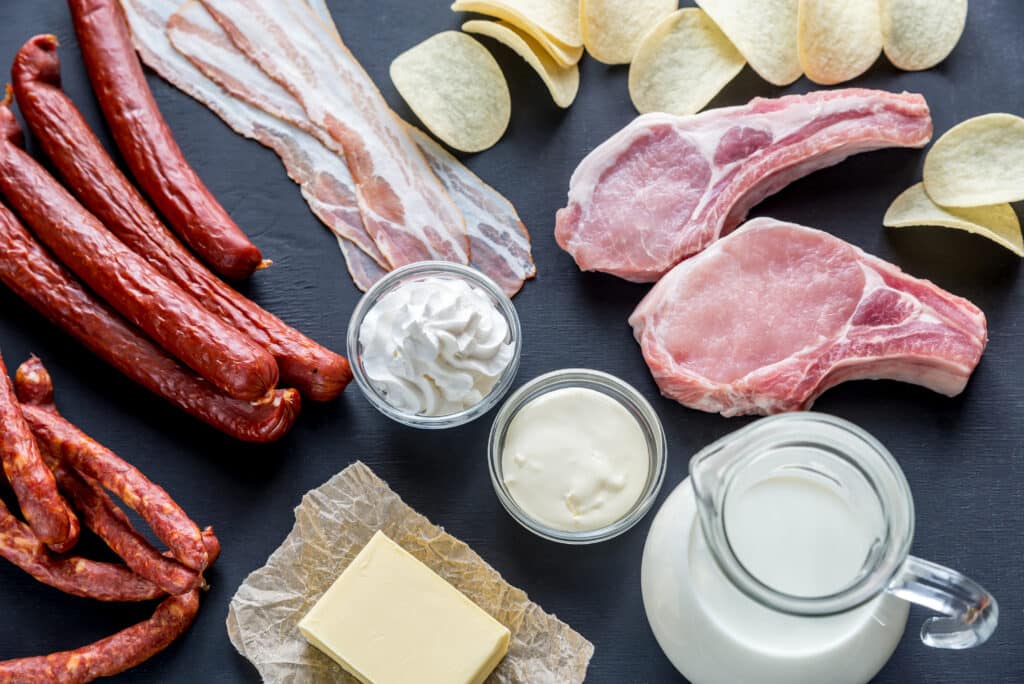Over the years, there has been a lot of debate regarding saturated fat. Below, author and James Beard Award winner, Tamar Haspel, dives into it all and provides her thoughtful conclusion. This article originally appeared in the Washinton Post and is reprinted with permission from the author.
Let’s tackle saturated fat, shall we? It’s something people brawl about on social media, and (mostly) cordially disagree about in scientific literature. I could write a persuasive piece, chock full of experts and evidence, that comes down on either side: Sat fat is harmful, or sat fat is benign or even beneficial.
But dig a little deeper, and the story gets clearer. Clearer, actually, than most nutrition issues. And that story is that sat fat is bad.
For a long time, that was the prevailing idea, but then there was doubt. I date the backlash to Mark Bittman’s 2014 New York Times column, “Butter is Back,” which pinned its headline on a meta-analysis concluding that saturated fat consumption wasn’t correlated with increased heart disease risk.
Since then, there have been others. And the evidence has spawned quite a few sat-fat contrarians.
Could they be right?
Going into this, I believed that we should limit saturated fat intake, because I believe these two things:
1. Saturated fat raises LDL (a.k.a. “bad”) cholesterol.
2. LDL cholesterol increases heart disease risk.
I talked with a couple experts who were on the same page: cardiologist Ethan Weiss, formerly of the University of California at San Francisco and now entrepreneur-in-residence at Third Rock Ventures, a biotech venture capital firm; and Kevin Klatt, registered dietitian and research scientist at the University of California at Berkeley. But I also wanted to talk to the smartest, best-informed person I could find who didn’t agree with me. Ronald Krauss is a professor at UC-San Francisco, and co-author of a 2020 paper taking issue with the Agriculture Department’s Dietary Guidelines recommendation that we limit saturated fat to 10 percent of calories. “The recommendation to limit dietary saturated fatty acid (SFA) intake has persisted despite mounting evidence to the contrary,” the paper claimed.
The conversation with Krauss didn’t go exactly as planned, since we started off with an area of complete agreement: You can’t figure out saturated fat from observational research.
Much of the research exonerating saturated fat (including the relevant parts of the study Bittman cited) comes from researchers following large groups of people, asking what they eat, and seeing what diseases they get. I will spare you my rant about what a lousy tool I believe this to be, and just say that I think inaccurate data and a bazillion confounding factors disqualify it from settling the saturated fat issue, or finding any causal link between food and health where the effect is small.
Take those studies off the table, and you’re left with clinical trials. A lot of them.
Let’s take the link between sat fat and LDL first.
At least two things can affect whether, and the extent to which, saturated fat raises LDL. One is the kind of saturated fat, and the other is the kind of food it’s contained in.
Share this articleNo subscription required to readShare
Four of the saturated fats we commonly eat (they have names, but are often referred to by the number of carbon atoms they contain) are C12 (lauric acid), C14 (myristic acid), C16 (palmitic acid) and C18 (stearic acid). According to Krauss and Klatt, C14 and C16 (which together are most of the saturated fats in meat and dairy) reliably raise LDL. C12 (the main fat in coconut oil) and C18 (which our bodies readily break down to a monounsaturated fat) are a little different.
The actual food matters, too. Even if two foods contain the same saturated fats, the effect on cholesterol can be different. There’s evidence that some kinds of dairy — cheese and yogurt, for example — don’t raise LDL as much as other sat-fat-rich foods, and may sometimes even lower it. Nobody’s quite sure why (Krauss points out that there may be other properties of the foods that have compensatory effects), but the differences have been observed across a wide range of trials.
All sat fats are not the same. All foods that contain sat fats are not the same. At the end of the day, though, I think it’s wholly supportable to say that saturated fat raises LDL cholesterol, even though some sat-fatty foods — coconut oil and some dairy, for example — don’t seem as harmful.
But there’s only harm, of course, if raising LDL does indeed raise heart disease risk, and everyone I spoke with agrees that it does. Weiss calls it a “borderline fact,” and Krauss is unequivocal: “LDL is causal in cardiovascular disease.” And there’s a large body of evidence to support it; when lowering LDL reduces heart disease risk, that’s pretty telling. A 2016 meta-analysis found that lowered LDL levels were associated with lower rates of major coronary events. As did another in 2020. So did a 2012 Mendelian randomization analysis. I could go on.
Again, though, there are some nuances. Weiss explains that some in the cardiology field (including Krauss) emphasize the different kinds of LDL (small and dense, which may be more harmful than large and fluffy), and others focus on apoB, a protein that coats the LDL particles and may be a better indicator of disease risk. While acknowledging these issues, he calls them a “distraction.” LDL cholesterol is still a good indicator — although not the absolute best — of risk. It’s easy and cheap to assess, and a decent proxy for other measures that may be somewhat more accurate.
I asked Klatt and Weiss not just about fat and cholesterol, but about the extent of the consensus, and both said it’s broad. Klatt called the science “super solid,” something we don’t hear about nutrition all that often. To be clear, that doesn’t mean there aren’t trials that show something different; it’s just that the vast preponderance of the evidence points in the same direction.
Which brings us back to Krauss, who, as my chosen representative of Team Sat Fat, was a grave disappointment because he doesn’t dispute any of this. His objection to the recommendation to limit sat fat isn’t because he thinks the stuff is beneficial: “I’ve never said there’s anything good about saturated fat. … There’s no reason we need it in our diet.” And, when he sees patients who are at high risk for heart disease, he tells them to limit it.
“But,” he says, “If you’re trying to advise someone who needs to lower heart disease risk, that should involve limiting foods that are high in sat fat. That’s not the same as population guidelines.” Krauss gave me several reasons he opposes the limit: Not everyone has to lower risk, the 10 percent cutoff is arbitrary, and guidelines, he believes, should focus on foods rather than nutrients — particularly since the food that contains the saturated fat matters.
Reasonable people can disagree about the specific recommendation. Because the case for the harm saturated fat does is so strong, I’m in favor of keeping it, even though I generally agree that recommending foods or dietary patterns is better than focusing on specific nutrients.
However, I don’t think reasonable people can disagree very much about saturated fat itself. Much of it, in most of the foods it figures in, raises LDL cholesterol, which increases heart disease risk.
That should settle it, don’t you think?



High quality websites are expensive to run. If you help us, we’ll pay you back bigtime with an ad-free experience and a lot of freebies!
Millions come to AmazingRibs.com every month for high quality tested recipes, tips on technique, science, mythbusting, product reviews, and inspiration. But it is expensive to run a website with more than 2,000 pages and we don’t have a big corporate partner to subsidize us.
Our most important source of sustenance is people who join our Pitmaster Club. But please don’t think of it as a donation. Members get MANY great benefits. We block all third-party ads, we give members free ebooks, magazines, interviews, webinars, more recipes, a monthly sweepstakes with prizes worth up to $2,000, discounts on products, and best of all a community of like-minded cooks free of flame wars. Click below to see all the benefits, take a free 30 day trial, and help keep this site alive.
Post comments and questions below
1) Please try the search box at the top of every page before you ask for help.
2) Try to post your question to the appropriate page.
3) Tell us everything we need to know to help such as the type of cooker and thermometer. Dial thermometers are often off by as much as 50°F so if you are not using a good digital thermometer we probably can’t help you with time and temp questions. Please read this article about thermometers.
4) If you are a member of the Pitmaster Club, your comments login is probably different.
5) Posts with links in them may not appear immediately.
Moderators